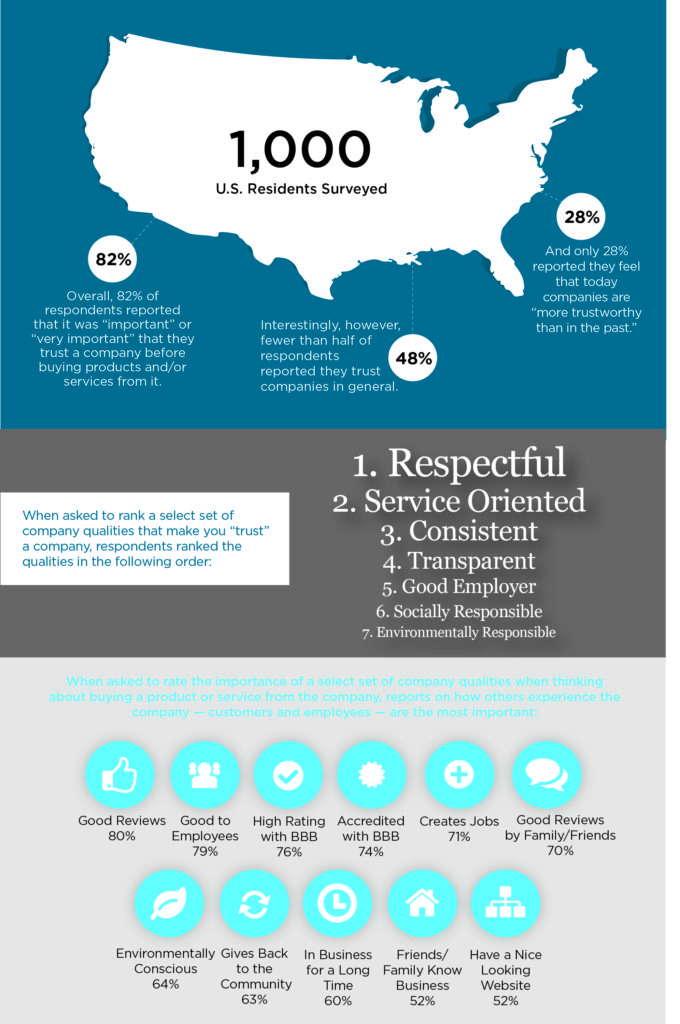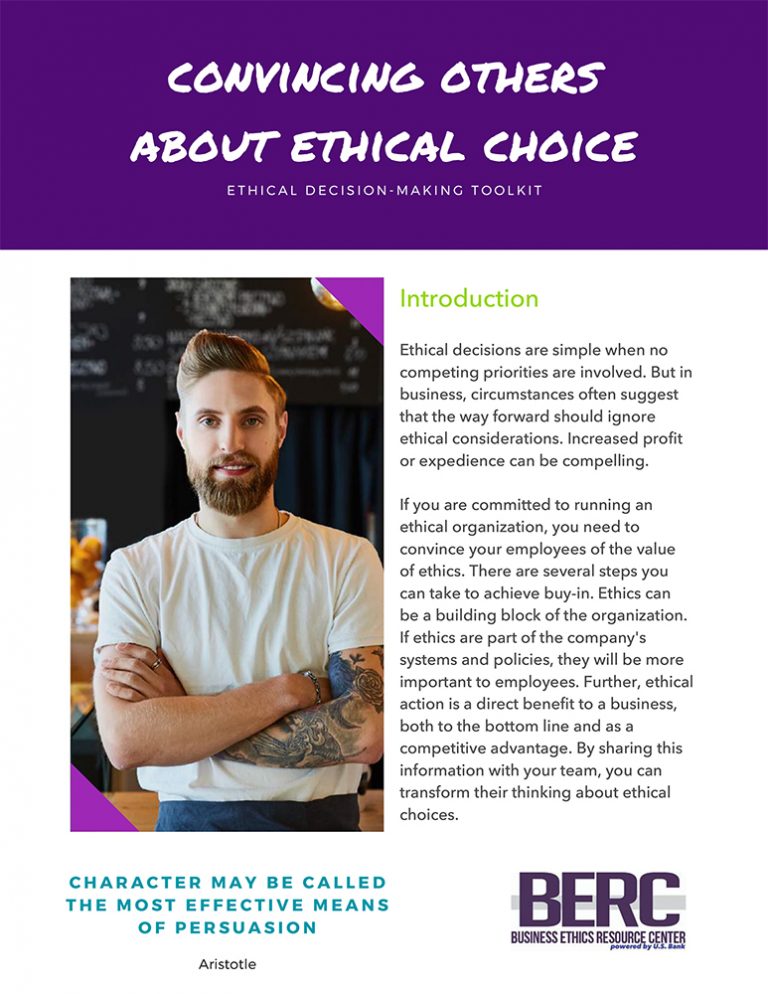
Five “gestures of respect” may determine whether they do or not
In the fall of 2015, as an ethnographer who helps organizations understand how their audiences see the world, I was asked by Council of Better Business Bureaus (CBBB) to examine how consumers think about interactions with businesses. Ultimately, the goal was to define what a better business is and to garner best practices that businesses can follow to be deemed noteworthy in the eyes of the consumer. My research would end up complementing research CBBB conducted separately on what it means to be a better business.
To gain an understanding of how consumers view their interactions with businesses, in 2015, I interviewed 18 consumers across four U.S. metros: Charlottesville, Va; New York City; Atlanta; and Seattle.
I interviewed them in their offices and homes about their experiences with companies. These consumers were from varied backgrounds, stages of life, professional experience and regions of the country. The group was ethnically diverse and consisted of 11 males and seven females.
Although we talked in general about experiences my hosts had with businesses, I listened particularly for how each participant mentally constructed the consumer-business interaction: What were the factors they used to evaluate a business? Which aspects of an interaction became the key ingredient of a story? What measures did they use to determine a positive or negative experience with a business? Here are some examples of what I heard in the words of the people I interviewed:
TREAT ME LIKE A HUMAN BEING
Doug is a 65-year-old male who lives in Charlottesville, Va. Doug’s imprint of the world began to take shape in his childhood home of Levittown, a coal-mining hamlet in easternmost Pennsylvania. Levittown became part of American middle-class lore owing to its endless rows of “cookie-cutter” homes and Truman Show-like stillness. Levittown, to Doug, meant the slow, if localized, lingering death of humanity.
Today, when Doug walks into Martin Hardware, a local Charlottesville-based hardware store, he is struck by the obvious disarray: “You can’t find anything in that store unless you’ve been there many, many times,” explains Doug. “But there is always someone there who will take you right to what you need and is very knowledgeable about the products in the store. And if they don’t have what you need, they quickly and confidently refer you to a competitor that does.” To Doug, this personal care and honesty keeps him coming back to Martin’s, when superstores like Lowe’s and Home Depot are nearby and often offer lower prices on many items.
Doug tells a story of another business in town, a used car dealer. Yes, a used car dealer. I really enjoyed a recent car purchase…The guy I bought it from I’ve purchased five other cars,” says Doug. “Why? Because he listens to me, has been in the community for a generation and has an excellent reputation. But mainly because he listens to me.”
Doug makes it clear that for him business should be considered based on three key criteria: 1) Does it care about its customers; 2) Does it consider its impact on the community; and 3) Does it attempt to leave a light footprint on the planet? This most often points him toward local, family-run businesses as often as possible. From his many accounts of interactions with business as a consumer, simple humanity is what he prizes most.
TOP-DOWN POSITIVE WORK ETHIC
Jay, who is in his early 30s, is on the sales team of a rapidly growing start up based in Atlanta. Young, single and focused on career, Jay’s most frequent interactions are with his gym, local restaurants, and clothing stores. When discussing “positive” experiences he has had with businesses as a consumer, he is most quick however to mention QT, a convenience store/filling station concept that has locations throughout the Southeast and Midwest. (“QT” is short for “QuickTrip Corporation” and stands as the company’s public-facing brand.)
If you go into any QT, they’re very engaging. The minute you walk in the door, no matter how crowded they are, the cashiers are friendly and talkative, and they’re always doing something else as well, they’re just not standing behind a counter . . . I found out they have a really good hiring process — it’s top-down solid.”
Indeed, according to QT’s website, Fortune magazine has rated the company one of the “Best Companies to Work For” for the past 13 years. QT also reports that it donates 5 percent of its net profits to charitable organizations.
Jay’s focus on the personality and qualities of the stores’ employees reflects the focus the younger adult consumers I spoke with have on how they are greeted and treated as consumers and, interestingly, what they might observe about a store’s employees. Jay makes a point of what the counter people at QT are doing when not directly tending to customers — a certain positive work ethic is communicated and this registers positively with Jay.
EMPATHY IS AWESOME
Constance is a training director with a technology company in Atlanta — she helps to ensure that customers are maximizing the benefits of the company’s product. Raised in Michigan, she attended the University of Michigan and moved to Atlanta for more opportunities.
Constance relates two stories she purposely juxtaposes to contrast her experience as a consumer. The first, involves a company that provides gourmet food and food related items, packaged in appealing combinations — often for gifts. She purchased such a gift package for her parents. She noticed, however, that the company placed another charge on her credit card a few weeks later. She asked them to remove the charge. When it was not removed, she inquired and was told that she had signed up for a subscription — a gift package would arrive at her parents’ home once a month. Constance explained that she had not realized it was a subscription. The company representative replied, “We’re sorry that you overlooked the information about the subscription.” Exasperated, Constance points out that they put all of the responsibility on her, with no empathy for the client. “It left such a bad taste in my mouth. It was really unfortunate, because my parents really liked the products!”
In her next story, Constance explains how she ordered clothing from an online store located in Europe. The clothes arrived, yet they were a different color than what she had ordered. Constance contacted the company to return the items and to see if the color she had wanted was still in stock. The company responded by immediately shipping her the correct order, two-day delivery. Constance was taken aback — she could not believe they would send the corrected order without having received the items she was returning first. “Now that was awesome,” she explained.
To Constance, paramount in the consumer experience is a sense that the company is out to please the customer and take responsibility for that. A focus on what will satisfy the customer regardless of the circumstances connects with what Constance values.
IT FEELS GOOD WHEN THEY ASSUME I’M RIGHT
Michelle mirrors what Constance wanted to talk about most. A former teacher turned Internet marketing specialist, Michelle now keeps very busy as a tutor for grade school-aged students. She rents an apartment in Manhattan and, like many city residents, spends a lot of her consumer time in restaurants, shops, and coffee houses.
Among the many experiences we discussed, the ones that jump out to her are her many encounters with American Express. She has had a few occasions to examine charges on her card and notes, “Whenever I speak with them, they always assume I’m right.”
Michelle’s simple comment about her interaction with a single company echoes the anxiety many consumers appear to feel when encountering businesses — that somehow the business is in a power position and can decide to “grant” the consumer special consideration when the consumer approaches with a concern. By immediately securing Michelle a position of power and status in the conversation, American Express apparently assuages Michelle’s anxiety and gains her attention and respect.
FOLLOW-UP NATIONAL SURVEY
To further explore the consumer mindset, in November 2015, I surveyed an additional 1,000 U.S. residents, using a population panel reflective of the 2010 U.S. Census both geographically and demographically. I asked these consumers about trust and how important certain factors might be when purchasing products or services from a company.
To consumers, most of the time, your business is more than a place to get products or services. Rather, it is viewed as a human exchange.”

GESTURES OF RESPECT
My hosts talked about a lot of things, but when it came to whether they felt good about the business they were dealing with, they chose to focus on themes of human interaction. The themes that cut across all of the conversations and survey responses support the notion that the consumer experience is in large part the product of a three-layered narrative.
The foundational layer is based on the following premises:
- Business transactions are at their heart power relationships — each party is interested in exchange, but seeks to ensure the exchange benefits them.
- Despite the advent of technology as a potential intermediary, business transactions are power relationships between humans.
- In human relationships, trust comes when the parties attempt to manage their power fairly and demonstrate their willingness to do so.
The second layer reveals that because the business interaction is essentially a power relationship, being respected in that relationship — essentially maintaining equal or greater power — is paramount, and thus respect becomes the key value that drives the consumer’s sense of trust in a purchase context.
The third layer reveals the behaviors, or gestures, that consumer-trusted businesses perform on a regular basis. These behaviors lead consumers to trust businesses because they directly address the consumer’s key value — respect — that is at play in every business transaction. A consumer appears most likely to trust a company when the company is: equitable, humble, proactive, transparent and honest.
SO WHAT DOES ALL OF THIS MEAN?
As a business owner, your goal is to build a base of customers who want to do repeat business with you, and are motivated to share their positive experiences with your company with everyone. To consumers, most of the time, your business is more than a place to get products or services. Rather, it is viewed as a human exchange.
The most important thing companies can do to win customers, therefore, may be to enhance the humanness of the experience. This begins by showing respect for the customer as well as taking to heart the five gestures of respect outlined in this article.
If these gestures are key markers for consumers involved in business transactions, then companies who follow these gestures are more likely to have loyal customers who feel respected and want to continue doing business with those companies.
It’s pretty simple. If you haven’t already — try applying these gestures to your way of doing business and see what happens. It may transform the way your customers view your company. It may transform the way you and your employees view your company as well.
By: Craig Honick, June 24, 2016
This article was used with kind permission of the Better Business Bureau.


